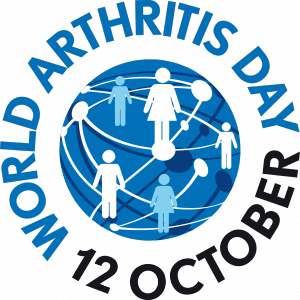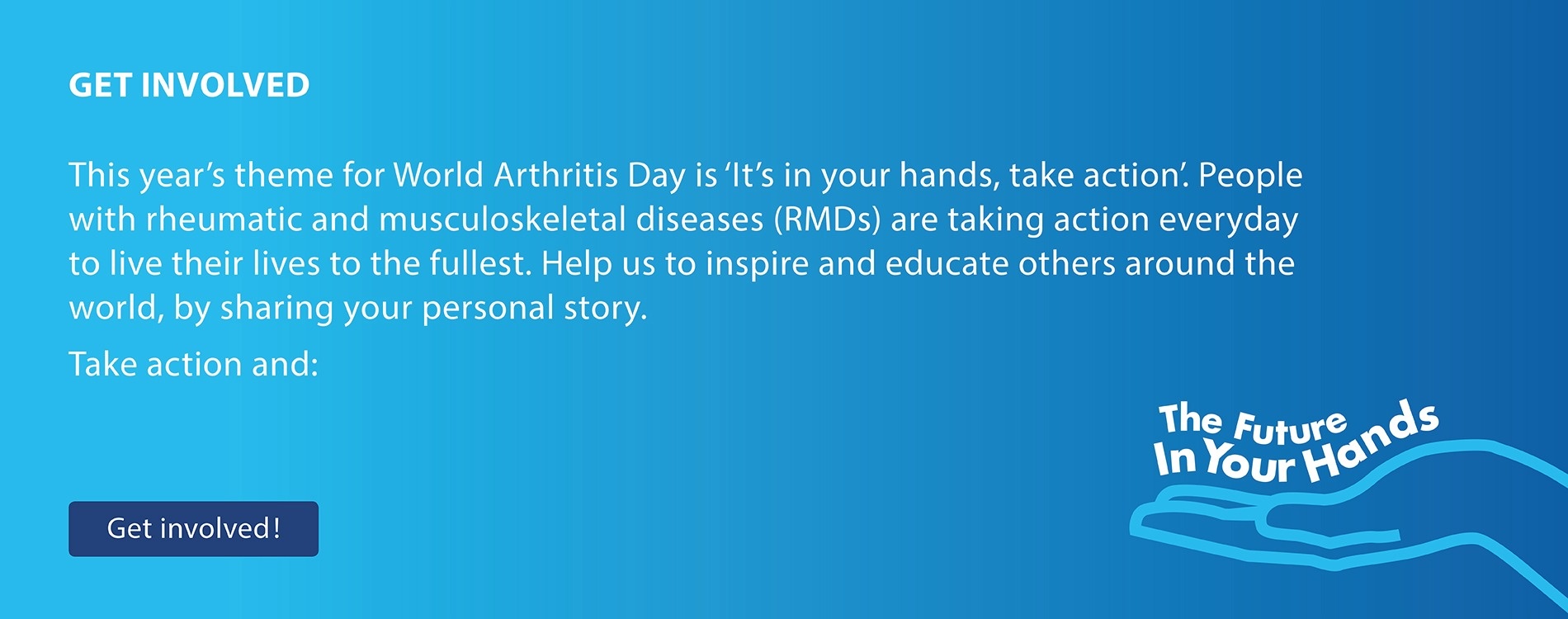
World Arthritis Day
Saturday is World Arthritis Day we are proud to share the fantastic media information created by the team at World Arthritis Day (http://www.worldarthritisday.org)
“Over 50,000 people from over 80 countries around the world are waving their support for people with rheumatic and musculoskeletal diseases
Today we celebrate World Arthritis Day and our campaign to raise awareness
of the importance of physical activity for people with rheumatic and
musculoskeletal diseases (RMDs).
In May we invited people to send us photographs and videos of people waving their support
for World Arthritis Day and people with RMDs. The response has been amazing, and the
numbers of people waving continues to climb day by day. Waving is a small gesture, but we
hope our campaign will have a big impact in helping people with RMDs to become more
physically active and encouraging policy makers to support all efforts to facilitate this.
Research shows that even small amounts of physical activity can benefit people with RMDs,
helping them to stay mobile, independent and able to participate in society. This campaign
is part of the World Arthritis Day 2011-2012 theme of ‘Move to Improve’.
Photographs and videos, featuring families, teams and individuals waving received up to 16
September have been included in a superb mosaic photomontage that campaigners will be
using for their World Arthritis Day events and promotions around the world.
“We are thrilled by the number of people who have contributed to our waving campaign,”
says Maria Batziou, leader of the World Arthritis Day Task Force and Chairperson of the
Standing Committee of PARE. “The support and enthusiasm we have received has been
fantastic and we would like to thank each and every person who took the time to send in
their waving pictures and videos, as well as all those who have been actively involved in
spreading the word amongst their networks.”
Word about the campaign has spread through an active social media campaign and, to
inject a little healthy competition into the campaign, countries have been ranked and the
top five with the most people waving are feature on the Home page of the website – other rankings can be found by country. As some awareness campaigns fall after the 12 October the waving gallery will remain open until 31 October. Waving photographs and videos can be uploaded to the World Arthritis Day website via a computer or mobile device. Simply visit
www.worldarthritisday.org/waving and follow the five easy steps.
World Arthritis Day, which is celebrated every year on 12th October, provides a platform for
people with RMDs to make their voices heard and to highlight some of the issues faced by
people living with RMDs. RMDs, including rheumatoid arthritis, osteoarthritis and
ankylosing spondylitis, affect over 120 million men, women and children of all ages in
Europe alone.
For more information on rheumatic and musculoskeletal diseases (RMDs) and physical
activity visit the World Arthritis Day website http://www.worldarthritisday.org.”
They have also produced some rather useful background info which we would like to share.
What is ‘Waving for World Arthritis Day’?
Physical activity is vitally important for people with rheumatic and musculoskeletal diseases (RMDs),
which is why the ‘Move to Improve’ theme was created for World Arthritis Day (WAD) in 2011
/2012.
To generate awareness of some of the key issues facing people with RMDs in and build support for
the WAD ‘Move to Improve’ theme the Waving for WAD campaign provides a fun way to promote
an important message, by inviting everyone to photograph or video people waving for WAD – a
physical activity anyone can participate in!
Supporters from around the world joined in by taking a fun picture of their friends, families,
colleagues, team mates and wider networks waving their hands, arms or whole body. Pictures and
short videos of people waving were uploaded onto the World Arthritis Day website
(www.worldarthritisday.org/waving). Each person seen waving for WAD in the photograph or video
was counted. Photographs and still images from video footage of people waving received before 16
September have also been used as pixels in a giant picture (photomontage) to be used in national
campaigns on World Arthritis Day (12 October).
About rheumatic and musculoskeletal diseases (RMDs)
RMDs encompass more than 200 different diseases including inflammatory diseases such as
rheumatoid arthritis and ankylosing spondilitis and degenerative conditions like osteoarthritis and
osteoporosis.
RMDs are characterized by pain and a consequent reduction in the range, motion and function in
one or more areas of the musculoskeletal system; in some diseases there are signs of inflammation:
swelling, redness and warmth in the affected areas. Rheumatic diseases can also affect internal
organs.
Key facts
In the industrialised world rheumatic and musculoskeletal diseases affect more individuals than
any other disease group, with 120 million people affected across Europe alone
One third of people are affected by rheumatic and musculoskeletal diseases at some point during
their lifetime and people of all ages can be affected
Musculoskeletal complaints are the second most common reason for consulting a doctor and
account for around 10% to 20% of all doctors visits
75% to 85% of people will suffer from low back pain at some point in their lives

